On February 18 (Ash Wednesday), Lent begins. How to observe the 40 days before Easter? In this video, United Methodists talk about their choices — whether to give something up as a sacrifice, or add something to their devotional life. See what they say.
Youth Sunday: Three choirs
On Youth Sunday, February 8 at 9:30, choirs from three churches will praise the Lord. Our PUMC youth choir rehearsed with singers from Trinity Episcopal and Nassau Presbyterian, and these combined choirs visited the other two churches on January 25. Now we get to hear them! They will sing Cherubini’s “Like as a Father,” a traditional Zambian song, “Bonse Aba,” and “One Voice.”
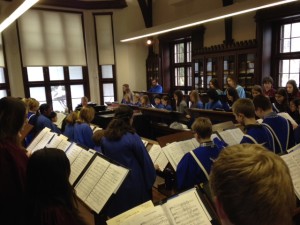
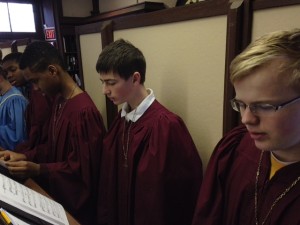

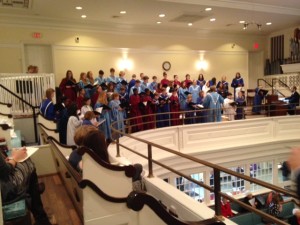 Thanks to PUMC’s Tom Shelton, Nassau’s Sue Ellen Page (shown here) , and Trinity’s Tom Whittemore for their leadership.
Thanks to PUMC’s Tom Shelton, Nassau’s Sue Ellen Page (shown here) , and Trinity’s Tom Whittemore for their leadership. 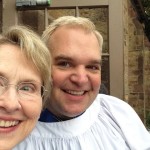
Rethink Church: for Lent — a photo a day
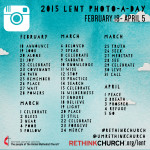
The website Rethink Church offers an unusual way to observe Lent: take a picture a day for that day’s theme (listed above). and post them on Facebook, as quoted here:
As we journey through this season of Lent, some will choose to give up something. Some will go about their lives as if it was ordinary time. Some will choose to be more reflective. Whatever your practices this season, will you join this photo-a-day challenge and share with the community how you perceive each word or phrase for the day? ….
You don’t have to be a great photographer. This project is more about the practice of paying attention and being intentional, than it is using the right filter or getting the perfect shot..
The first of the daily themes is Announce, for Ash Wednesday, followed by Look, Joy, and Alone. For details on this intriguing project, click here.
Adult education — drop-ins welcome
“Why I am an atheist who believes in God” is the book now being studied by the Contemporary Issues class, which meets in the library at 9:30 a.m. on Sunday mornings. The author, Frank Schaeffer, is the son of noted conservative evangelists who founded L’Abri, a chain of worldwide retreat centers. All are welcome, and new participants or drop-ins are encouraged. Click here for listings of other adult education opportunities — including the new study that starts this Tuesday evening.
“Dying to Live,” Phoebe Quaynor, February 1
“Dying to Live: dangerous and uncomfortable paths to the pursuit of truth” is the sermon topic for Communion Sunday, February 1, at the 9:30 and 11 a.m. services at Princeton United Methodist Church (PUMC). Seminary intern Phoebe Quaynor will tell about some of the people who have lit the path of freedom and the prices they had to pay.
 Originally native to Ghana, West Africa, Phoebe lived in Paterson, NJ until seminary education brought her to Princeton. Personally devoted to the contemplative arts, creativity and spirituality, she feels called vocationally to the ministry of Christian Education and is currently co-teaching the Confirmation class.
Originally native to Ghana, West Africa, Phoebe lived in Paterson, NJ until seminary education brought her to Princeton. Personally devoted to the contemplative arts, creativity and spirituality, she feels called vocationally to the ministry of Christian Education and is currently co-teaching the Confirmation class.
Also in the observance of Black History Month, Not in Our Town hosts a discussion on perceptions of black history. Set for Monday, February 2, at 7 p.m. on the third floor of Princeton Public Library, it is part of the Continuing Conversations on Race series, a safe place to talk about difficult questions. PUMC supports Not in Our Town. Everyone is welcome.
Imagining no malaria — responsibly

Wrong use of insecticide treated mosquito nets is killing fish in Zambia, according to a New York Times article, which says that fisherman are seining with nets intended to prevent malaria . In contrast, the United Methodists say they work, through education, to keep that from happening.
“Touched by Jesus”
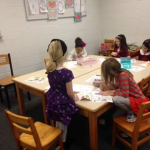
People who were “touched by Jesus” — that was the focus of January’s Sunday School classes, K-12. People like Jairus (Jesus healed his daaughter), the Samaritan Woman at the Well, the ten lepers, and the sisters, Mary and Martha. In this photo, the K-1 class. We learned how Jesus changes people “one heart at a time.”
Teach Us to Want: Tuesday Bible Study

As Christians, we are squeamish about desire. Isn’t wanting selfish? Aren’t we supposed to find and follow God’s will rather than insisting on our own?
Please join us for a new and exciting five week study, “Teach Us to Want: Longing, Ambition: the Life of Faith.” Author Jen Pollock Michel explores the themes of Fear and Courage, Grace, Scripture and Prayer, Petition and Confessions, Community and Commitment. Come and engage in conversation on how to identify and overcome the tension that sometimes exists between personal ambition, desire, and faith.
“When desire is informed by Scripture and reformed by our spiritual practices,” writes Michel, “it can root us more deeply in the fundamental belief that God is good and generous…”
Classes will be on Tuesdays at 7 p.m., weekly, from February 3 to March 3. The book is available in paperback or by download at Amazon or from the publisher, Intervarsity Press. Contact: Shivonne McKay at shivonne.mckay@ptsem.edu.
What We Believe: We seek to know God personally
In this essay Jeff Ransom has written the first in a seven-part series illustrating the vision statements of Princeton United Methodist Church as described here:
“We aim to know God personally as Father, Son, and Holy Spirit. We glorify God in our words and deeds and celebrate God’s love. We are open to all of God’s possibilities. As God loves us, so we love one another.”
The New Year: talking with my (new?) self
Wow! Whew! ‘Twas a great Christmas season: The celebration of the Christ child, family visits, food, carols, concerts, pageants, kids’ excitement, charity to all, even football playoffs and cleaning up. I enjoyed good times, good fellowship, good deeds, good services, and (good gracious me) – my new year resolutions.
Speaking of my resolutions: Am I good with God, after all that I’ve been doing for family, friends, and others in the church? I think I’ve been loving God and neighbor this season, but what about that other part – loving myself? Doesn’t Luke 10:27 (“You shall love the Lord your God with all your heart, and with all your soul, and with all your strength, and with all your mind; and your neighbor as yourself.”) say my relationship with God, and with others, should be as meaningful as my relationship with myself? If so, this passage is not just about me not being selfish, but about me being more loving to me as a model for me loving my neighbor and God. That love means I’m to try to be a better Christian disciple. God already loves me so much: John 3:16 (“For God so loved the world that He gave His only Son, so that everyone who believes in Him may not perish but have eternal life”).
Then how can I be more loving of myself so I can grow as a disciple?
Well, let me take stock of my “disciple checklist”: I listen to the sermons, give my time and money, serve on a committee or two, do community service, love and support others and my family. Am I missing anything in my “loving me by what I do” duties?
By now you have probably figured out that I’m talking about improving my spiritual growth, and becoming a mature Christian. To grow, I need to challenge myself. If I look at Jesus’ command in Matthew 5:48 (“Be perfect as your heavenly Father is perfect”), I realize there is no comfort in Christ from coasting, or resting at, where I already am.
The bottom line: I need to deal with two things: my sin, and my service – fighting the former, and growing the latter. Both are addressed by Jesus through the gospels, and by Paul, in his letters. According to Jesus and Paul (and for Methodists, John Wesley), I can’t make any progress by my own efforts. While the right next step is to seek the only capable helper, the Holy Spirit, my human-ness (reluctant to yield control) resists my inviting that help. Alone, I seem to restrict my own access to the Holy Spirit.
Because I can’t seem to manage this individually, I really need a love-binding community — a church community — of those in a similar condition. In such a community we can help each other to connect with the Holy Spirit and overcome our personal obstacles. Yet fear of exposing my “private issues” to others keeps me isolated, unable to move forward on my spiritual journey.
Is Princeton UMC not a trusted community where it is “safe” for me to take that next step? Well, No . . and Yes!
The NO answer: At the Sunday corporate worship service, or in the typical functional committee meeting, the church may offer a heart-warming or head-inspiring growth for the prepared disciple, but it just doesn’t seem to be the right “bare-your-soul space for spiritual changes” toward Christian maturity. The result: conversions of nominal or non-Christian persons do not often happen here. Don’t agree? Ask yourself, except for youth confirmations, how many professions of faith happen at PUMC ?
The YES answer: PUMC is exactly the right spot for me if I am in a small group that uses daily intercessory prayer and discretionary support of confessions for its members. I would have the accountability, caring and learning environment I need to commit myself to be a new creation, someone with an intimate relationship with God. If we invite others to join the groups, and seek to encourage new leaders, small groups could also provide a vital engine for church growth.
My conclusion: I should either start such a small group, or work toward revitalizing an existing small group.
If you conclude this is a personal message of resolution for its author, you are correct. Now go through it again with “you as the me.” Make it your own story to see if any of it resonates with your own discipleship path. See if you agree that, together in a small group, we could each be better disciples.
The Small Group Ministry at PUMC will look at existing small groups. More than 40 meet the minimal definition (hint: they’re groups which are . . small). Our principle was stated by Jesus in Matthew 18:20, “For where two or three are gathered in my name, I am there among them.” Many of us — including our annual conference leaders– believe our church and personal growth depends upon vital small groups.
Early this year PUMC will set up small group facilitator training and coaching support to help existing small groups aim to be more vital. We will also establish new vital small groups, either study- and/or mission-oriented, which follow the small group health guidelines for praying, caring, reaching out, and empowering. Let me know if you you’re interested. Let’s grow together!
Jeff Ransom, Lay Leader
“A Place for Everyone”

“A Place for Everyone” is the title of our January sermon series at Princeton United Methodist Church. Rev. Don Brash begins the series on January 4 at both services. On January 11 at 9:30 and 11 a.m. Methodist Bishop John Schol, Episcopal leader for the Greater New Jersey Annual Conference, will share the biblical witness about how everyone has a place in the church.
The church has been reflecting on what it means to be a reconciling congregation with respect to its relationship with brothers and sisters in the lesbian, gay, bisexual, and transgender communities. The reconciling congregation movement works for full participation in the United Methodist Church.
NJ.com (Times of Trenton) printed the news online and in print, click here.
